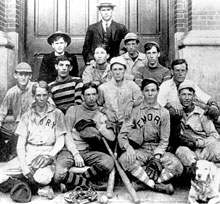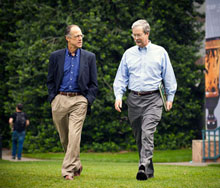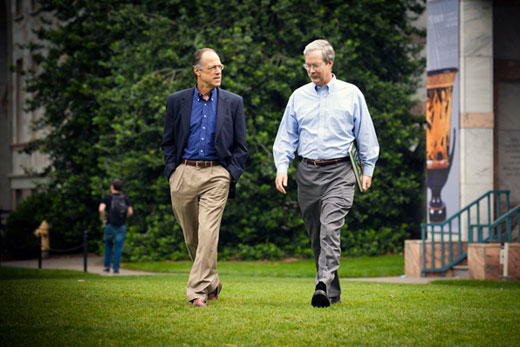With a historic legacy spanning over 175 years, how do you begin to tell the story of Emory University?
A new hour-long documentary set to air this month on Atlanta's PBA 30 public television station starts at the heart of what makes Emory unique — the spiritual, ethical and intellectual pulse of a world-class institution engaged in ongoing transformation.
"The Wise Heart: The Story of Emory University," premiered at 8 p.m., Thursday, April 26, with encore presentations at 10 p.m. and again on Sunday, April 29 at 8 p.m.
Produced and directed by David Hughes Duke, an Emmy award-winning writer and Georgia-based filmmaker, the program takes viewers on a richly textured journey through the historic milestones that helped a small, Methodist college grow into a multi-faceted, modern research university.
Following a dynamic storyline that moves viewers between past and present, Duke creates what he calls a "living history" both timeless and personal, told through the words of Emory students, faculty, trustees and administrators against a visual tapestry of archival photos and video.
"What we've tried to do in this film is to convey the scope of the University —its size, its complexity, its reach into the world — in a way, I think, that will surprise people," says Gary Hauk, vice president and deputy to the president and historian of Emory.
"We've also tried to convey a sense of the powerful transformations that have occurred, both within the University and through the University," adds Hauk, who helped write and guide the project.
"How this little college founded 175 years ago in the Georgia woods has morphed into this dynamic, huge, complicated, living city, essentially. And how in the process, it has helped to generate transformation around it."
Telling Emory's story on television

"The Wise Heart: The Story of Emory University" is the first televised production of its kind for the University and aims at capturing its 175 years of history. Photo courtesy of Emory Photo/Video.
Created in collaboration with Emory, the endeavor marks the first televised production of its kind for the University, says Ron Sauder, vice president for communications and marketing, who assisted with the project.
The program is, in part, a tribute to the University's 175th anniversary, celebrated last year. But the vision of bringing Emory's story to a larger, television audience goes back at least a decade, he adds. And the potential reach of a televised documentary is significant — Atlanta's PBA 30 routinely broadcasts to more than half-a-million area households per week.
"An hour-long public television broadcast by a professional documentary journalist is something we've never done before," Sauder says. "It's a powerful way of conveying the ethos and the humanity of a larger institution."
Sauder, who recently joined the Atlanta Educational Telecommunications Collaborative (AETC) board of directors, which oversees the management of PBA 30, recognized that partnerships between the AETC and community institutions, such as Emory, could provide high-quality content.
Duke had worked with the University in the past and offered a strong background in Atlanta history, along with knowledge of Coca-Cola and Robert W. Woodruff, Atlanta health care and theological institutions, Sauder says. "He brought a prism of understanding to this project based on 20 to 30 years of his own work."
Both Duke's son, John Duke, who helped produce the film, and his wife, the Rev. Ceci Duke, are Emory graduates.
The Emory community was granted a sneak peek at the documentary during Founders Week 2012. The final production explores many facets of the University, from its early history and Methodist founders to achievements, controversies and cutting-edge research.
"The scope of Emory is very broad," Duke says. "It's been a challenge to jump from science and AIDS research to public health to that great tradition of literary studies, to arts and music. Audiences will find humor, a little drama and pathos. I think they'll find it entertaining, not just educational."
"There are lots of important aspects of Emory's history that could warrant documentary specials all their own," Sauder notes. "We really have taken a mini-series and squeezed it into one episode."
Created in partnership with Emory

Vice President and Deputy to the President Gary Hauk, who also serves as University historian, with director David Hughes Duke. Emory Photo/Video.
.
The documentary was a year in the making, a widespread team effort that touched many corners of the Emory community, from MARBL archivists, research librarians, faculty and students, to campus photo and video services.
After the documentary premieres, the University plans to pursue new forms of syndication and distribution, including finding a national audience and making DVDs of the program available to the public.
"There's a lot of material that was not included — including some interviews — that would be wonderful to find a home for, whether it's on our website or on a dedicated site," Hauk says. "I would love to have DVDs available in the bookstore, or maybe playing on an eternal loop in our admissions office."
The title of the project, "The Wise Heart: The Story of Emory University," arises from the University's motto: "The Wise Heart Seeks Knowledge."
"To me, it really exemplifies what Emory is all about, which is a special fusion of discovery, scholarship and intellectual work of the highest order, along with a commitment to values," Sauder says.
"What distinguishes this film is the richness of that history," he adds, "the way it relates many different aspects of Emory to a common thread — the humanity at the core of Emory."

